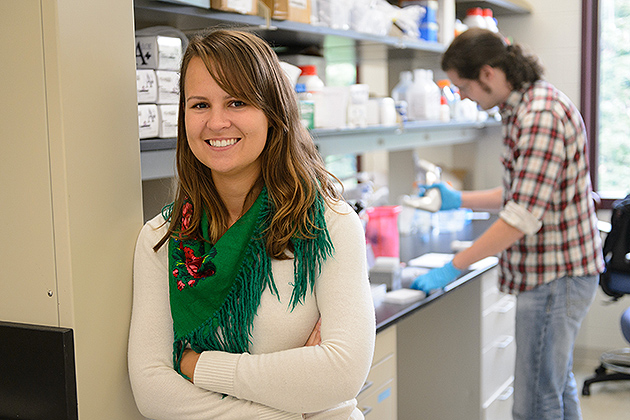
Undergraduate students are rarely exposed to commercial research environments very early in their college careers. Thanks to the UConn-TIP Biotechnology Summer Research Intern Program, a new 10-week research program established by Associate Professor Caroline Dealy, three UConn students had the opportunity to work closely with startup biotechnology companies in Farmington this summer.
The startups are part of TIP, UConn’s Technology Incubation Program, which is designed to accelerate the development of early-stage technology companies. Through TIP, startup companies can leverage University facilities and services that would ordinarily be unavailable to them.
Two TIP companies, Chondrogenics Inc. and Synbody Biotechnology Inc., hosted the students participating in the new intern program, offering them hands-on lab experience alongside a mentor. The interns were able to see how a startup company works, from both a research and a business perspective.
“The program grew out of my own very positive experiences with UConn’s biotechnology efforts, and the recognition that interfaces between academics and industry are powerful tools for promoting discovery, progress, and opportunity,” says Dealy, associate professor

of reconstructive services at the UConn Health Center as well as co-founder and chief scientific officer at Chondrogenics. “Bridging this interface with a student intern program seemed like a win-win for everyone: the student, the University, and state biotechnology.”
‘Eye-Opening Experience’
Recent UConn graduate Mike Tassavor ’12 (CLAS), who is now pursuing a master’s degree in biomedical science at Tufts Medical School, was one of the three students selected for the intern program. He spent the summer with Chondrogenics Inc., a company focused on developing and commercializing a stem cell therapy for the treatment of osteoarthritis.
One of Tassavor’s roles in the lab was to investigate how different types of stem cells signal to one another as they differentiate. Chondrogenics is exploring the potential use of these stem cells in regenerating cartilage for joint repair.
Tassavor had done undergraduate research with stem cells in the past, but says he felt that his involvement with Chondrogenics was much more enlightening.
“It was a very eye-opening experience,” says Tassavor. “I got to see what it’s like to be a biomedical researcher.”
Marta Chlus ’14 (CLAS), a dual biology and chemical engineering major, interned for Synbody Biotechnology Inc., a company of three full-time employees who are working to develop synthetic antibodies. These “synbodies” can be used as modes of investigating drug activity in the body and could potentially improve the performance of these drugs.
The small size of the Synbody lab was Chlus’ favorite aspect of the summer internship program. Chlus says that her mentors were very supportive, paying close attention to her research and giving her helpful guidance.

Gilman Dionne ’12 (CLAS), who also worked with Synbody, has transitioned from summer intern to part-time employee at the company. While furthering his studies in the master’s program in structural biology and biophysics here at UConn, Dionne continues to gain practical experience in the startup company’s lab.
Some of Dionne’s many jobs in the Synbody lab include measuring the affinity between peptides and target molecules and developing new synbodies, an area of research in which he says there is great potential.
Learning Beyond the Classroom
The interns say they are grateful for their experience in the startup labs, and would recommend the program to their peers. “When you read a journal article, you always see the end product. What you don’t see are the thousands of hours put into the optimization of the experiment and its results,” says Dionne. “You can learn in a classroom, but it’s nothing compared to what you learn in a laboratory.”
The future of the UConn-TIP Biotechnology Summer Research Internship Program is bright, Dealy says. “Next year we look forward to additional support for the program from UConn’s College of Liberal Arts and Sciences and College of Agriculture and Natural Resources, as well as TIP company hosts at other TIP locations, which include Storrs and Avery Point,” she says. “This will enable us to expand this opportunity to more student interns this summer.”
The TIP intern program will also partner with other student summer research programs at UConn to further enhance student learning opportunities and industry-academia interactions.
Dealy says she hopes that this biotechnology-focused intern program will serve as a model for the development of similar student intern programs in UConn TIP labs in other fields, such as engineering, chemistry, and computer science.



